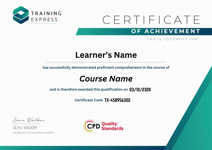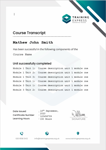
Mechanical Engineering and Electrical Engineering Basics
4 FREE Certificates | 4 CPD Accredited Courses | Unlimited Retake | Lifetime Access
Training Express Ltd
Summary
- Digital certificate - Free
- Hard copy certificate - Free
- Exam(s) / assessment(s) is included in price
- Tutor is available to students
Add to basket or enquire
Overview
In the modern world, both Mechanical Engineering and Electrical Engineering basics are paramount for various industries. Understanding Mechanical Engineering principles, from mechanics to thermodynamics and machine dynamics, ensures proficiency in designing, analyzing, and optimizing mechanical systems. Similarly, knowledge of Light Current Systems and Advanced Electrical Safety is crucial in Electrical Engineering, facilitating the safe and efficient operation of electrical equipment and systems.
With a 15% increase in demand for Mechanical Engineers and a 20% rise in opportunities for Electrical Engineers across the UK, mastering these disciplines opens doors to lucrative career prospects, with average annual salaries ranging from £35,000 to £45,000. Moreover, the advantages of pursuing these courses are evident in the expanding sectors.
Enroll in these courses to gain comprehensive knowledge and skills essential for success in the dynamic fields of Mechanical and Electrical Engineering.
Key Features:
- CPD Certified
- Instant e-certificate and hard copy dispatch by next working day
- Fully online, interactive course with audio voiceover
- Developed by qualified professionals in the field
- Self-paced learning and laptop, tablet, smartphone-friendly
- 24/7 Learning Assistance
- Discounts on bulk purchases
CPD
Course media
Resources
- Training Express Brochure - download
Description
Course Curriculum :
Mechanical Engineering
- Module 01: Introduction
- Module 02: Engineering Mechanics – I
- Module 03: Engineering Mechanics – II
- Module 04: Heat and Thermodynamics
- Module 05: Work, Force and Energy
- Module 06: Fluid Mechanics
- Module 07: Structural Mechanics
- Module 08: Machines – I
- Module 09: Machines – II
- Module 10: Machine Dynamics
- Module 11: Mechanical Design
- Module 12: Hydraulic Machines
- Module 13: Strain Hardening Processes
- Module 14: Application of Solidification
- Module 15: Welding
- Module 16: Engineering Drawing
Light Current Systems for Electrical Engineering
- Module 01: Light Current Fire Alarm System
- Module 02: Light Current MATV and Telephone System
- Module 03: Light Current Data System
- Module 04: Light Current CCTV System
- Module 05: Light Current Sound System
Advanced Electrical Safety
- Module 01: Safety Precautions
- Module 02: Direct Current
- Module 03: Alternating Current Basics
- Module 04: Voltage and Resistance
- Module 05: Capacitance and Capacitors
- Module 06: Working Safely with Electrical Equipment
- Module 07: Electrical Incidents
- Module 08: Risk Assessment
- Module 09: Reducing and Controlling Risks
- Module 10: Combined Inspection and Testing
Electrician Diploma Course Level 3
- Module 01: Intro Basic Electricity
- Module 02: The Nature of Electricity
- Module 03: Conductors & Insulators
- Module 04: Current and Electric Circuits
- Module 05: Ohm’s Law
- Module 06: Electric Power
- Module 07: Series _ Parallel Circuits
- Module 08: Circuit Theorems
- Module 09: Electric Fields and Capacitance
- Module 10: Transient Response Capacitors & Inductors
Learning Outcomes:
- Understand fundamental principles of Engineering Mechanics and Thermodynamics.
- Apply knowledge of Fluid Mechanics and Structural Mechanics in real-world scenarios.
- Analyze and design mechanical systems, including machines and hydraulic machines.
- Demonstrate proficiency in Strain Hardening Processes and Solidification applications.
- Develop skills in Engineering Drawing for effective communication in the field.
- Gain expertise in Light Current Systems for Electrical Engineering applications.
- Master fundamental concepts of electricity and circuitry for practical application.
- Develop skills in risk assessment and electrical safety protocols.
- Apply knowledge to analyse and solve engineering problems effectively.
Accreditation
All of our courses are fully accredited, including this Mechanical Engineering and Electrical Engineering Basics Course, providing you with up-to-date skills and knowledge and helping you to become more competent and effective in Mechanical Engineering and Electrical Engineering.
Certification
Once you’ve successfully completed your Mechanical Engineering and Electrical Engineering Basics Course, you will immediately be sent a digital certificate. Also, you can have your printed certificate delivered by post (shipping cost £3.99). Our Mechanical Engineering and Electrical Engineering Basics Course certification has no expiry dates, although we do recommend that you renew them every 12 months.
Assessment
At the end of the Mechanical Engineering and Electrical Engineering Basics Course, there will be an online assessment, which you will need to pass to complete the course. Answers are marked instantly and automatically, allowing you to know straight away whether you have passed. If you haven’t, there’s no limit on the number of times you can take the final exam. All this is included in the one-time fee you paid for the course itself.
Who is this course for?
This Mechanical Engineering and Electrical Engineering basics Course can be taken by anyone who wants to understand more about the topic. With the aid of this Mechanical Engineering and Electrical Engineering basics course, you will be able to grasp the fundamental knowledge and ideas. Additionally, this Mechanical Engineering and Electrical Engineering basics Course is ideal for:
- Individuals aspiring to comprehend Mechanical and Electrical Engineering basics.
- Students seeking foundational knowledge for further studies in engineering.
- Professionals aiming to diversify their skill set in light current systems.
- Enthusiasts interested in understanding the principles of mechanical design.
- Anyone keen on acquiring skills in welding and application of solidification.
Requirements
Learners do not require any prior qualifications to enrol on this Mechanical Engineering and Electrical Engineering basics Course. You just need to have an interest in Mechanical Engineering and Electrical Engineering basics Course.
Career path
After completing this Mechanical Engineering and Electrical Engineering basics Course you will have a variety of careers to choose from.
- Mechanical Engineer - £30K to 45K/year.
- Structural Engineer - £32K to 50K/year.
- Machine Design Engineer - £35K to 55K/year.
- Electrical Systems Technician - £28K to 42K/year.
- CCTV System Installer - £25K to 40K/year.
Questions and answers
Currently there are no Q&As for this course. Be the first to ask a question.
Certificates
Digital certificate
Digital certificate - Included
Once you’ve successfully completed your course, you will immediately be sent a FREE digital certificate.
Hard copy certificate
Hard copy certificate - Included
Also, you can have your FREE printed certificate delivered by post (shipping cost £3.99 in the UK).
For all international addresses outside of the United Kingdom, the delivery fee for a hardcopy certificate will be only £10.
Our certifications have no expiry dates, although we do recommend that you renew them every 12 months.
Reviews
Currently there are no reviews for this course. Be the first to leave a review.
Legal information
This course is advertised on reed.co.uk by the Course Provider, whose terms and conditions apply. Purchases are made directly from the Course Provider, and as such, content and materials are supplied by the Course Provider directly. Reed is acting as agent and not reseller in relation to this course. Reed's only responsibility is to facilitate your payment for the course. It is your responsibility to review and agree to the Course Provider's terms and conditions and satisfy yourself as to the suitability of the course you intend to purchase. Reed will not have any responsibility for the content of the course and/or associated materials.








